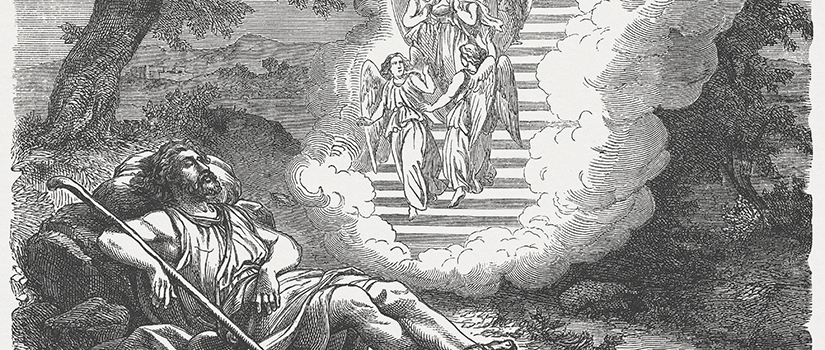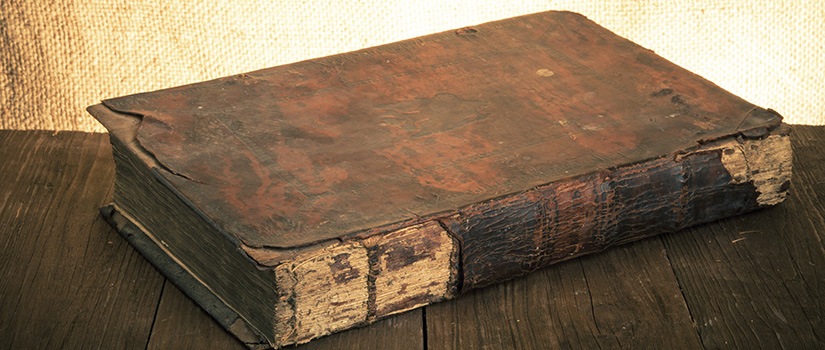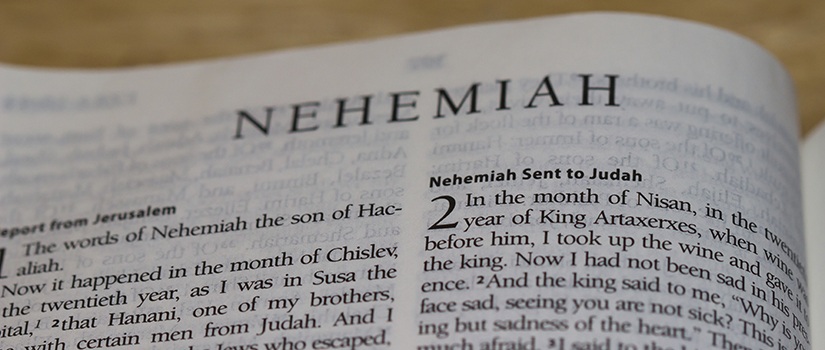JACOB’S NIGHT AT BETHEL
Jacob Receives The Blessing Of Almighty God, And Of Abraham:
Genesis 28:3. And God Almighty bless thee, and make thee fruitful, and multiply thee, that thou mayest be a multitude of people; 4. And give thee the blessing of Abraham, to thee, and to thy seed with thee; that thou mayest inherit the land wherein thou art a stranger, which God gave unto Abraham.
When approached by Rebekah, Isaac called Jacob and blessed him with the blessing of Almighty God, and of Abraham. Many feel that this second blessing was when Isaac bestowed the blessings of the Covenant upon Jacob. “The blessings Of “El-Shadai,” “God Almighty” be upon thee.” (Genesis 28:3). Then Isaac bestowed upon Jacob the inheritance of the land (Genesis 28:4)
Jacob then sent him to Paddan-Aram, a district of Mesopotamia, so that he would find a wife among his mother’s people rather than among the Canaanites.
The people of the East were not Canaanites, this is the reason that Isaac sent Jacob down there. Abraham had made it plain in the choosing of a wife for Isaac that she would not be a Canaanite (Genesis 24:3-8). God intended, and through divine intervention, to keep the seed pure.
Jacob’s Night At Bethel: (Genesis 28:10-22)
So Jacob left the security of his father’s house to go to Haran.
It would take a man at his age (now 77 years old) 20 to 30 days to travel so far (500 miles) on foot alone, in a strange country—no roads, only caravan trails, few landmarks, no food but what he could gather along the way, no houses of rest on the way, with “nothing but a staff in his hand” (Genesis 32:10).
His heart was heavy as he walked—his thoughts only on his troubles which he had brought upon himself. He had lied to his father; he had deceived him and obtained his brother’s blessing. His mother had told him to, “go for a few days and I will send for you” (Genesis 27: 44-45). But Jacob realized it would be much longer, in fact he may never see them again, he thought. Actually he never saw his mother again.
This blessing he had been so anxious to receive had only made him an outcast, a wanderer, a stranger in a strange land. Many times we feel as Jacob felt, our new found faith separates us from old friends, making us an outcast from their society.
It had been a long weary journey that first day when Jacob left the shelter of his home at Beersheba. More than forty miles, a long day’s walk, he had traveled over the mountains and through desert-like country, when at last the sun had set and the last glow faded out from the hills of Ephraim.
Genesis 28:10. And Jacob went out from Beersheba, and went toward Haran.
11. And he lighted upon a certain place, and tarried there all night, because the sun was set; and he took of the stones of that place, and put them for his pillows, and lay down in that place to sleep.
How many of you have slept (or laid) on a bed which seemed to have rocks in it? I’ve slept on lumpy feather beds. I’ve also slept on straw ticks which gouged me every time I moved. There is an old saying, “If you make your bed hard, you will have to lay on it.”
Jacob had made his bed hard—he would have to lay on it.
Never a man has lain down, on any bed, more troubled than Jacob was that night. He was a fugitive, and he was afraid.
This was probably the first night in Jacob’s life that he had to sleep outside. Jacob had been a mama’s boy, nourished from his earliest Youth with all the tenderness and care of a mother’s love. His brother Esau could be close behind, wild beasts were lurking on every side; roving bands of men were always waiting to way-lay some lone traveler coming by.
As the sun set Jacob piled stones around him for protection, he laid his head down on a stone for his pillow. But when men lose all confidence in himself, it is time for God to help. To such a man, unworthy, remembering all the things he had done, sleep doesn’t come easy. Finally in the solitude of the darkness Jacob fell asleep.
God’s Unexpected Presence:
Genesis 28:12. And he dreamed, and behold a ladder set up on the earth, and the top of it reached to heaven: and behold the angels of God ascending and descending on it. 13. And, behold, the LORD stood above it, and said, I am the LORD God of Abraham thy father, and the God of Isaac: the land whereon thou liest, to thee will I give it, and to thy seed;
14. And thy seed shall be as the dust of the earth, and thou shalt spread abroad to the west, and to the east, and to the north, and to the south: and in thee and in thy seed shall all the families of the earth be blessed.
15. And, behold, I am with thee, and will keep thee in all places whither thou goest, and will bring thee again into this land; for I will not leave thee, until I have done that which I have spoken to thee of.
Few passages in the entire Bible have equaled these verses (Genesis 28:10-22) in their influence upon religious thought. The story of Jacob’s dream about the ladder set upon earth and reaching up to heaven, and the angels ascending and descending on it.
No man could number the souls who have taken heart at the thought of it. “It could happen to me,” is our thought. This story is told and retold in prayers, and hymns, and sermons every Lord’s Day, artists have portrayed it, yet the vision remains undimmed.
In this dream-vision (we should never forget that this was a dream) Jacob received divine assurance that the God of Abraham and Isaac was with him in his wanderings, and would bring him back again into this land and give it to him and to his seed as an inheritance forever.
Jacob was a fugitive and he was afraid—he, in our estimation, had not deserved a vision of God—but he needed it. All his life in his groping and unworthy way he had desired it. He had never been content with the things of the flesh, as Esau was.
Even guilty of all his many sins he knew that there was a higher righteousness to which he was accountable. No doubt that this was the first of Jacob’s many encounters with God. This dream would be remembered all the rest of his life. The same is true of ourselves the first encounter we have with God is never forgotten. Neglected, misplaced, but never forgotten.
Jacob’s Response To The Dream:
Genesis 28:16. And Jacob awaked out of his sleep, and he said, Surely the LORD is in this place; and I knew it not.
17. And he was afraid, and said, How dreadful is this place! This is none other but the house of God, and this is the gate of heaven.
18. And Jacob rose up early in the morning, and took the stone that he had put [for] his pillows, and set it up for a pillar, and poured oil upon the top of it.
19. And he called the name of that place Bethel: but the name of that city was called Luz at the first.
20. And Jacob vowed a vow, saying, If God will be with me, and will keep me in this way that I go, and will give me bread to eat, and raiment to put on,
21. So that I come again to my father’s house in peace; then shall the LORD be my God:
22. And this stone, which I have set for a pillar, shall be God’s house: and of all that thou shalt give me I will surely give the tenth unto thee. (KJV)
Our lesson from this is that even in our unworthiness, in our fears, in our unexpectedness of any favor, God appears, sometimes in our darkest night. Many are quick to point out doubt in Jacob’s prayer (vs. 20-22), but after all it was only a dream, and it took all the rest of his life to make it a reality (Genesis 48:3-4).
Jacob’s night at Bethel was a great turning-point in his life. This night vision reassured him of the reality of his mother’s conversation with God (Genesis 25:22-23, one of the very few conversations recorded that God had with a woman) that he would be the one that God would call to be the father of a great nation.
Jacob was seventy-seven when he left Beersheba for Haran. He would spend twenty years serving his uncle Laban, thirty-three years back in Canaan, and the last seventeen years of his life in Egypt. We would like to take note of the absence of worldly goods, we could say poverty, of Jacob when he arrived in Haran. He reminds God of this in his prayer 20 years later, when he was on his way back to Canaan.
Genesis 32:10. I am not worthy of the least of all the mercies, and of all the truth, which thou hast shewed unto thy servant; for with my staff I passed over this Jordan; and now I am become two bands.
When Jacob left home he did not take part of the flocks he had cared for so many years. Only the clothes on his back and a few provisions to sustain him in his journey and his staff were all he took.
He mentions his staff in his prayer. This staff was a life-long companion. He, no doubt, had chosen a long straight sapling in his early days, spending much time whittling and seasoning it until the finished product was about 7 feet long, and very sturdy to lean on and fend off any wild beasts which attacked him or the flocks.
This staff was made for a life-time of service and was never out of reach at any time. It is also interesting that it was this same staff that Jacob leaned on the top of, and worshiped God, in his final hour (Hebrews 11:21).
To be able to lean on the top of it means that he had worn about 3 feet off the bottom of it. Just think every step Jacob took in his long life of wandering over Canaan, down into Haran, back into Canaan, finally down into Egypt, his trusting staff also took a step, until it too was old and worn. Probably 130 years of service.









